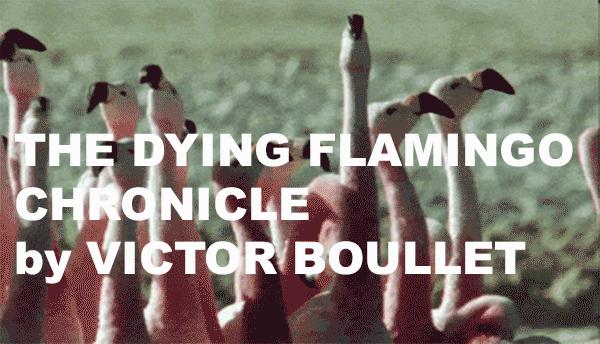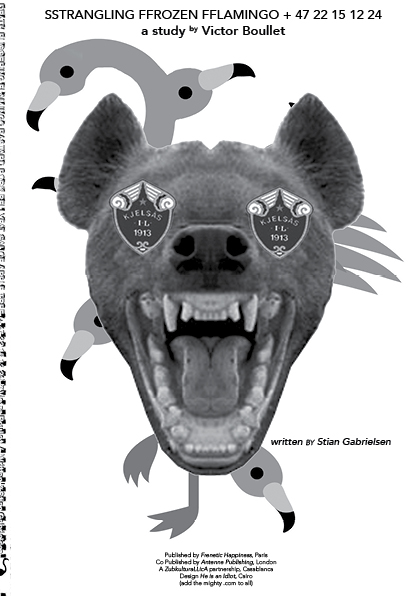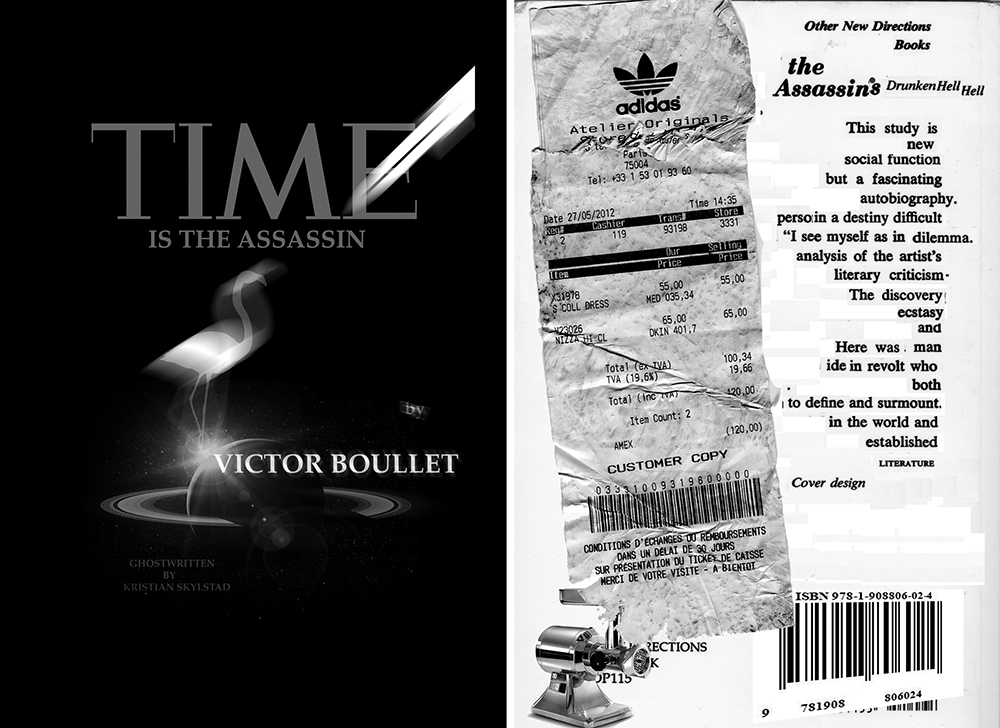
|
| BOOK NO 3 Will be released 2014 BOOK NO 3 Will be released 2014 BOOK NO 3 Will be released 2014 |
 |
SSTRANGLING FFROZEN FFLAMINGO + 47 22 15 12 24 ISBN 978-1-908873-01-9
Sstrangling Ffrozen Fflamingo + 47 15 12 24 is the second installment in a trilogy, if I have interpreted the cryptic fragments of information the book provides us with correctly. I have not read the first one, Time is the Assasin, and the third one, Pull That That, is not out yet. It is unclear to me what kind of literature this is – even after having read the whole book I’m still not sure. The plot evolves around the protagonist Victor Boullet and his relation to his childhood home. The chronology is jumbled so it’s kind of hard to piece together the story. Suffice to say that Victor grew up in Oslo, lives in Paris, and has come back to Oslo because his mother is selling the house he grew up in. He walks around the place and feels connected to it in various pathological ways and has flashbacks. One of these flashbacks form the most substantial part of the book. Here is related in detail a night out a few years earlier, where the neighbourhood bar, Flamingo, plays a prominent part. All three of the books have different writers, the only constant signature across the entire project is Victor Boullet’s (and that of his idiosyncratic, cairo-based designer-cohort He is an idiot, whose absolute disregard for all coherence and readability is astounding). Judging from a description of Time is the assassin that you can find on Antenne books’ website, it too narrates roughly the same story: Boullet’s night out. My guess is that this same story will also form the basis for the last installment in the trilogy. The circulation of the same story through these different creative frameworks draws focus to the process of writing a biography, or, more specifically, the precarious condition of biographical truth. This is how I suspect the method works: Boullet approaches these writers with a request for them to write about a specific event from his past, but this event is only conveyed in outline. It is then left to the writer to flesh it out and turn it into a literary composition. This raises both issues of ownership (whose story is this, who is telling it? Boullet or Gabrielsen?) and, as I mentioned above, biographical truth; to what extent does this literary rendition of an episode from the life of Victor Boullet present things as they actually transpired? Though mostly held within the limits of plausibility, it’s pretty clear from how the events evolve that fact is abandoned at some point. The book isn’t written like a traditional biography either; highly speculative psychological explanations proliferate throughout. This abundance of dubious causation made me start to think about how arbitrary the reasons we give for our actions are. (This is also a theme discussed in the book, in relation to art and intentionality.) In my career as a defence lawyer I’ve often been presented with the absence of reasonable motivation for the heinous crimes that some of my clients have committed. Whatever they offer as explanation seems like random guesswork, at best. And this isn’t always due to some inclination to come across as more conscientious beings than what they are. They are simply genuinly bewildered as to what on earth it is that moves them to do what they do, so they make up some story that sound probable to themselves. It is the lack of self-knowledge that they need to cover up, and not the sadism that we are so quick to presume. Perhaps this book, by dislodging Boullet’s biography from his actual experience and offer it up to speculation and confabulation, in some way ponders a similar question: What’s our truth? Are we even capable of truth? The themes of childhood and belonging that runs through the text connects this problem of truth with that of agency. If I don’t know from where my passions and ideas arise – what precedes them – how can I claim to be in control? Will I always be anchored outside myself? Despite that the author at times falls for the temptation to turn Hemingway’s Iceberg Theory on its head and overindulge his desire to interpret the story’s protagonist, the book offers an entertaining and thought-provoking read. Mona H.
|
 |
Time is the Assassine by Victor Boullet 2012 Victor Boullet's new book Time is the Assassin takes the form of an autobiographical novel, ghostwritten by Kristian Skylstad. The story follows Victor, his two brothers, and two of their friends on a night out in the neighborhood were Victor grew up (and Skylstad too, as chance would have it.) Time is the Assassin is narrated chiefly in the form of a dialog between the five of them, interspersed with flashbacks to Victor's past and the increasingly perverse and surreal events of their intoxicated night as it unfolds, out of Victor's hands. Autobiographical truth and the presumed consistency of Victor's self gradually unravels as it merges with Skylstad's attempts at expanding the reflective operations of his character across an insurmountable array of topics and references, abandoning the concept of autobiography in favour of a furious, interpretative, projective and wildly schizophrenic prose-exposition of the narrative's central character, Victor Boullet. The text feels written with the sadistic glee of a ghostwriter that knows his subject is bound by contract to accept his version as final. Sophisticated montage technique is conflated with shameless plagiarism and downright theft. The facts that constitute the autobiographical part of this book are only a point of departure for a foray into the confused and tormented psyche of... well, that's hard to tell. Wether unwitting victim or self-abasing man-in-control, Victor Boullet emerges from the ruins of this narrative certainly not unscathed, and assuredly not whole. • |
 |